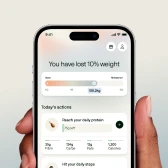When you’re trying to lose weight but it isn’t going the way you hoped, it’s tough to stay motivated and keep going. We get it—it can be super demoralising. Sometimes it can feel like you’ve tried everything, but keep coming up short.
That’s why new weight loss medicines, like Wegovy and Mounjaro, are generating so much interest for men and women. Some people taking them lose up to 25% of their starting weight.
But they aren’t a “quick fix”. These medicines are meant to be taken alongside healthy lifestyle changes for at least a year. So, to get the most out of them, you’ll need to stick with your new routine for the long run.
We know that’s much easier said than done—but we also know that you can do it. Here’s some tips to help you stay on track.

The start of your weight loss journey
Right now, we bet you’re feeling excited for what’s to come (if not a little nervous) and are keen to get started. We’re excited for you, too!
The trick is to channel that energy into making specific, achievable changes that you’ll repeat again and again, until they become second nature. Here’s our advice on forming a plan you’ll stick to.
Be realistic
It sounds obvious, but the more realistic a goal seems, the more likely you are to try and achieve it.
For example, if you’re aiming to move your body more, going for a brisk, 30-minute walk five times a week might seem doable—but going for an hour, three times a week, might not. So, the first option would make it into your new routine.
Pick a strategy that matches your lifestyle
Your goals should make sense for you personally, too: they should align with your preferences and routines. If you can find a way to make your new habits work for you, you’re more likely to keep doing them—especially if you enjoy them.
An obvious example is finding healthy meals you like the taste of, or that are quick to prepare so you can slot cooking into your schedule. Equally, there’s loads of different ways to move your body: cycling, playing tennis, hiking, roller skating, or dancing around in your kitchen. Pick whatever feels best!
Commit to sustainable progress
If there’s one thing that makes a weight loss journey successful, it’s consistency. Sticking with a behaviour is what transforms it into a habit, and habits are what drive results.
Here, it helps to check in with yourself regularly and hold yourself accountable. For example, planning your meals ahead of time is a way to commit to that menu. Or, you could block out regular slots in your calendar for exercise.
Weight loss motivation tips: how to keep going
Your next challenge is keeping up your new habits. Here’s some advice to help you stay on your path—we know you’ve got this.
Celebrate your wins
Don’t forget to cheer yourself on, no matter how small the win. You deserve it!
Positive reinforcement can do wonders for your motivation. It’s a reminder that you can do it—which, as pointed out in research, is a belief that makes us more willing to take action to lose weight.
Reflect on your journey
Keeping tabs on your progress not only reminds you of what you’ve achieved so far, but can help you develop a sense of accountability and stay on track. For example, keeping a diary can make you more aware of what you’re eating and your habits around food. That’s why our weight loss programme includes access to an app, where you can monitor how far you’ve come.
Know that it’s about more than the scale
This is a really important point. Weight loss may be measured in terms of numbers, but what it’s actually about is improving your overall health.
In fact, losing just 5% of your weight is associated with health benefits like lower cholesterol and better blood pressure. You might also notice that you’re got more energy, are sleeping better, have less joint pain, are feeling better mentally, and more.
Any and all of these changes are something to celebrate!
Reach out for support
Remember: you aren’t alone. Leaning on your friends, family, your Voy coaches, or even online communities for support can help you drum up the motivation to keep going (and there’s science to prove it, too!). Trust us—having that accountability, but also encouragement from others, can make a huge difference.
Keep things fresh
If your routine starts to feel like a chore, chances are that your motivation will dip. So, try to mix things up.
Cook a new recipe, switch up your workouts, or introduce something new to your routine—like meditation or another mindset practice. This can help re-ignite your excitement for making healthy changes and moving closer to your goals.
Be kind to yourself
The path towards your health goals isn’t a straight line. There’s going to be ups and downs, and maybe even some moments where you feel like you aren’t going to get there.
That’s totally normal. So, when you are feeling low, don’t beat yourself up about it. Show yourself some compassion: you’re doing something difficult and it’s going to take time. Being kind to yourself can help you accept where you’re at and motivate you to keep going.
It’s not a race. You’ll reach your goals exactly when you’re meant to.
Can weight loss injections help with motivation?
Definitely. Weekly injections, like Mounjaro or Wegovy, are only one part of the picture when it comes to weight loss, but they can help drive serious results. And seeing those changes can be very motivating indeed.
These medicines work best when they’re taken as part of a lifestyle change programme—like ours, for example. We’ll post your weekly medication to you and give you one-to-one access to our team of coaches, who will work with you to create a personalised plan of action. Plus, as we mentioned earlier, you’ll get an app to monitor your progress. Check if you’re eligible by filling out this short form, you’ll find out in minutes.
Arrone, Louis J., et al. “Continued Treatment with Tirzepatide for Maintenance of Weight Reduction in Adults with Obesity: The SURMOUNT-4 Randomised Clinical Trial.” JAMA, vol. 331, no. 1, 2022, pp. 38–48. pmc.ncbi.nlm.nih.gov/articles/PMC10714284/.
Avishai, Aya, et al. “Setting Realistic Health Goals: Antecedents and Consequences.” Annals of Behavioral Medicine, vol. 53, no. 12, 2019, pp. 1020–1031. academic.oup.com/abm/article-abstract/53/12/1020/5445382.
Binsaeed, Bayan, et al. “Barriers and Motivators to Weight Loss in People with Obesity.” Cureus, vol. 15, no. 11, 2023, article e49040. pmc.ncbi.nlm.nih.gov/articles/PMC10729542/.
Hardcastle, Sarah J., et al. “Motivating the Unmotivated: How Can Health Behaviour Be Changed in Those Unwilling to Change?” Frontiers in Psychology, vol. 6, 2015. www.frontiersin.org/journals/psychology/articles/10.3389/fpsyg.2015.00835/full.
Horn, Deborah B., et al. “What Is Clinically Relevant Weight Loss for Your Patients and How Can It Be Achieved? A Narrative Review.” Postgraduate Medicine, vol. 134, no. 4, 2022, pp. 359–375. www.tandfonline.com/doi/full/10.1080/00325481.2022.2051366.
Institute of Medicine (US) Subcommittee on Military Weight Management. “Weight-Loss and Maintenance Strategies.” Weight Management: State of the Science and Opportunities for Military Programs, National Academies Press (US), 2004. Accessed 16 Dec. 2024. www.ncbi.nlm.nih.gov/books/NBK221839/.
Oscarsson, Martin, et al. “A Large-Scale Experiment on New Year’s Resolutions: Approach-Oriented Goals Are More Successful Than Avoidance-Oriented Goals.” PLOS One, vol. 15, no. 12, 2020, article e0234097. pmc.ncbi.nlm.nih.gov/articles/PMC7725288/.
Thøgersen‐Ntoumani, Cecile, et al. “Does Self-Compassion Help to Deal with Dietary Lapses Among Overweight and Obese Adults Who Pursue Weight-Loss Goals?” British Journal of Health Psychology, vol. 26, no. 3, 2020, pp. 767–788. bpspsychub.onlinelibrary.wiley.com/doi/10.1111/bjhp.12499.
Verplanken, Bas, and Sheina Orbell. “Attitudes, Habits, and Behaviour Change.” Annual Review of Psychology, vol. 73, 2022, pp. 327–352. www.annualreviews.org/content/journals/10.1146/annurev-psych-020821-011744.
Wilding, John P.H., et al. “Once-Weekly Semaglutide in Adults with Overweight or Obesity.” The New England Journal of Medicine, vol. 384, no. 11, 2021, pp. 989–1002. www.nejm.org/doi/full/10.1056/NEJMoa2032183.





















